If you're new here, you may want to subscribe to my RSS feed. Thanks for visiting!
With only a week remaining before we take off on our next adventure, I’ve been thinking about the lessons I learned here in the northern forests of Ontario. The biggest lesson I learned is that practical skills have to be practiced. When I moved here, I thought I was well-prepared and self sufficient. Spending a year here taught me how little I actually knew.
We got the opportunity to give up city life and move to a rural area of Ontario, on the outskirts of Algonquin Park. When the chance arose, the timing was a blessing – we were dealing with the loss of my daughters’ father. He had recently passed away very suddenly, leaving our family heartbroken and grief-stricken. My oldest daughter was moving out on her own, so my youngest and I jumped at the chance for a change of scenery, living the prepper’s dream of isolation, natural resources, and a self-reliant lifestyle. Because I work from home, there was no search for a job. My daughter is a little adventure-seeking gypsy too, so we enthusiastically committed ourselves to a year in a lakeside cabin on the edge of a vast wilderness.
When my daughter and I moved here, we had the prepping mindset, but we were city girls. Our wilderness experiences were based on day hikes and Youtube videos. We’d made the occasional backyard bonfire with wood purchased at a local grocery store. We dealt with a power outage due to bad weather perhaps once a year. We lived in a place where anything we might need was within walking distance and where you could stretch a skipping rope in the distance from our house to the neighbor’s house.
Within two weeks of finding the cute little rental cabin, we were in a U-haul loaded to capacity, towing our truck behind us, and slowing down for a young bear to cross the road in front of us.
We arrived in the summer, and life in the boondocks is always easier in a temperate climate. We located all sorts of wild fruit in the 23 acres of forest behind the cabin and put up jars of it for the winter ahead. We hiked, explored, and set out in a canoe on pretty much a daily basis. I sat there on my deck every morning, overlooking the lake and working on the laptop. Life had become a coffee commercial. My daughter and our younger dog spent more time in the lake than on dry land.
We had one neighbor up the hill – the nicest couple you could ever meet. They patiently instructed us on the ins and outs of living right smack dab in the middle of nature, sharing our yard with bears, deer, and moose. Aside from them, our isolation was pretty complete. We lived on a private lane so no one was ever “just in the neighborhood.”
As fall approached, we ordered a load of wood, and that’s when the real work began. As a newbie, I got the load already split, and it’s a good thing, because there’s no way I would have gotten enough wood for the winter ready otherwise. Six loads of wood the size of the picture below were unceremoniously dumped in my driveway. This, of course, had to be stacked immediately, and covered with a tarp to keep it dry. A city-style gym workout does not compare to stacking six cords of wood.
As fall approached, sadly, we lost our beloved dog Katie, our 14 year old Schnauzer. We buried her out in the forest that she got to enjoy in her last days. This is when I learned how terribly difficult digging in the woods is – you hit roots constantly, and I actually broke the first shovel I used. Many preppers have plans to create a dug-out for shelter or to dig a latrine in the woods. If you haven’t tried digging a hole in the forest, I strongly suggest you do so – you might rethink your plans.
By October, the spectacular surroundings became even more breathtaking. Everywhere you looked was ablaze with color. Almost overnight, it went from summer to autumn, with shorter, chillier days. I finally got all the wood stacked, and got some brought inside. I had the wood stove chimney cleaned and did lots of canning. There is a small, expensive grocery store here in town. To go to the larger grocery stores or department stores, the drive was an hour and a half to the nearest town of about 10,000 people. Obviously, that isn’t a trip to be undertaken frequently when the weather is bad, so a bit of stockpiling is a way of life around here.
My daughter got a longbow as a birthday gift from a good friend of mine. Because of our relative isolation, we were able to set up a target right in the field behind the house and practice our archery skills daily. We both learned to use a bow and arrow with considerable accuracy, a skill that is a bit unusual in this day and age that could become invaluable in the future.
It finally got cold enough that a fire was needed to take the chill off in the evening. I had made some backyard fires for roasting marshmallows, but building a fire in the wood stove that lasted was a whole different story. That’s when I learned how green I really was. The first major lesson I learned was that starting a fire is easy – keeping it going is another matter. I emailed back and forth with friends who had more experience than I, and began to really worry that my daughter and I were going to freeze to death over the course of the winter, since that little wood stove in the living room was the only source of heat in the cabin.
It took me a solid month before I was able to consistently build a blazing fire and keep it going. A few readers scoffed at my ineptitude, but I don’t want to be misleading and make people think that all this homesteading-in-the-wilderness stuff comes easily. Perhaps it does for some people, but for me, it took making a lot of mistakes to learn to do things properly. Luckily I had a couple of months before deadly freezing weather arrived during which I could master this skill – but if your plan is to bug out and heat with wood, my suggestion is to practice now, as often as possible, because it isn’t as easy as throwing a match on a pile of logs.
Our next challenge was dealing with a low well. A dry summer had caused the water table to be extremely low, and thus we had very little water to draw from our well for household usage. This also meant that the water coming from the taps was dirty and silty. We bought big jugs of spring water for cooking and drinking. I rigged up a little filter to put under the tap in the kitchen in order to wash dishes and clean, with a coffee filter and a mesh colander. Because of the high water usage of a washing machine, we had to do our laundry off-grid for a couple of months – also a tremendous amount of work. My best advice for off-grid laundry is to invest in an industrial style mop bucket with a wringer – it will save you lots of effort and help your clothes to dry much faster then just wringing the clothing out by hand.
Then there was the shaky grasp on electricity. Throughout our time here we had no less than one power outage per month, and sometimes more. After the first couple of outages, we learned some ways to streamline our power-outage process. The biggest challenge was that our pump ran on electricity, so no power = no water.
- At the first sign of high winds, we immediately filled the bathtub to provide us with water for flushing.
- We organized a box of power outage entertainment, complete with card games, dominoes, puzzle books, and craft supplies.
- We located candles decoratively around the house, and kept matches near them.
- We kept a “display” of solar lights in a decorative planter on the deck. When the power went out, we could just go grab the fully charged lights and place them in vases for extra lighting.
- We got a cast iron Dutch oven for cooking on top of the woodstove.
- I canned more “meals” so that the only requirement was heating up the food on top of the woodstove
- I got a lockable storage bench for the deck to use as a back-up fridge/freezer depending on the outdoor temperature.
Pretty soon, power outages were no big deal at all. The longest one was three days. We were cozy, entertained, and well-fed. The biggest inconvenience for me was being unable to work or communicate, since my internet was dependent on electricity and we had no phone service of any kind at the cabin.
Our first snow was really exciting. Of course, living in Canada, we’d had snow before, the the magical glorious snow coating the forest and the lakeshore made it seem like we were living in a Christmas card.
Our winter hobby was learning to identify tracks in the snow. It was interesting that during our walks through the woods we rarely saw any animals aside from chipmunks and birds. However, a fresh snowfall made for plenty of evidence that the forest was well-populated with many unseen neighbors.
The cabin was not well insulated, we discovered. We had to take numerous measures to stay warm when the temperature dipped down to seriously frigid temperatures like -50.
Our biggest snow was five feet. The howling wind blew so much snow against our door that we had to climb out the bedroom window and dig our way back into the house. We learned then the valuable lesson of storing a snow shovel inside, since we couldn’t find our shovel until after we dug our way to it using various improvised household substitutes.
The snow lasted from November until April. By January the lake was frozen over solidly and we could walk the entire length of it. Bringing in wood during the winter was not the most fun activity in the world. Your boots made the floor wet and slippery, and the loads seemed heavier when you had to trudge through the snow to carry them in.
We had the whitest Christmas we’ve ever had, and actually ended up snowed in for 4 days around the holiday. Luckily my older daughter arrived before the snowstorm did, so we had a lovely holiday together, cozily ensconced in our lakeside cabin.
A friend pointed out to me that it was important that I teach my daughter the ins-and-outs of keeping the fire going. Initially I was worried that she’d get burned and I wouldn’t let her add wood to the stove, more less light the fire. But he made the excellent point that if something happened to me, with our isolation, her life could depend on her ability to make a fire and keep it going. By the end of winter, little 12 year old Rosie could build a blazing fire and cook a meal on top of the wood stove with an ease that would make most adults jealous. From this, I learned that despite some risk, it’s also important to let your kids make mistakes so that they can learn self-sufficiency too – you can’t protect them from life.
The advent of spring is very different in the North. It sneaks up on you. The temperatures are a little bit warmer and you can go outside without feeling the insides of your nostrils flash-freezing. There are more tracks in the snow, proof that the animals are waking up and getting busy. You begin to see darkening thin patches in the ice that covers the lake.
By April we never wanted to see another flake of snow. It even snowed on my birthday during the first week of the month. Although the basic covering of snow melted, we still had snowfall occasionally throughout the month of May. However, the weather had warmed up, the roads were nice and clear, and we were able to spend lots of time outdoors again – such a relief after being cooped up for the better portion of the day for the previous six months.
By the beginning of June, the weather had gotten warm (at least for this area). Wildlife was everywhere – just driving through the park, you might meet any number of animals.
The lake finally melted and the dog is once again able to chase ducks in the water, then roll in the dirt. The woods behind our house are alive, lush and green. The downfall to spring in this area is the vast amount of bugs. Mosquitoes and blackflies will eat you alive if you stand still when you are outdoors. Natural solutions like lavender oil or Avon’s Skin So Soft work well to defend you against mosquitoes but nothing seems to work against the blackflies.
There is nothing that is so great a learning experience as living the life. No amount of books, websites, Youtube videos, or classroom-imparted information can prepare you like actually getting out there and immersing yourself in a self-sufficient or survival lifestyle. If you’re anything like me, you’ll make newbie mistakes, and that’s okay. Most of us have not lived a life that prepares us for survival and the only way to get prepared is to actually perform these tasks. Grow your food, chop your wood, and practice off-grid skills. Right now, you have back-up as close as the switch of your thermostat or the nearest grocery store. Make your mistakes now, while these things aren’t a matter of life and death. Not only will the practicing of these skills make you adept at them, but the accomplishments will give you the confidence required to overcome fear and thrive during challenging times.
I’m not suggesting that everyone has to give up their home and go live in a cabin in the woods in order to survive the future. However, you have to push yourself beyond the lifestyle that most of us live today. You have to practice going without water running from the tap or providing your own heat. You have to immerse yourself in what it means to live in a different way. If a city girl like me can learn these things, anyone can – they just have to be willing to inconvenience themselves. You’ll definitely make mistakes along the way, but from those errors will be born a knowledge that can only come from experience.
Canada has been my home since I was married 18 years ago. This beautiful, gracious country welcomed me and will always be dear to me. I will leave a little piece of my heart here, with my dear friends and family, in this place that I love.
But there’s no place like home, and now we’re off on our next adventure, moving to a little organic farm in the Pacific Northwest of the United States. I am excited about the challenge of learning to produce our own food on a much bigger scale and learning to keep livestock. We’ll be surrounded by good friends and we’ll learning a new set of skills in a completely different environment. The mistakes I’ve made over the past year and the lessons I have learned from them in our little northern cabin have given me a platform of competence and confidence with which to take on this next set of experiences.
I look forward to sharing our next adventure with you…
~ Daisy Luther
June 15, 2013

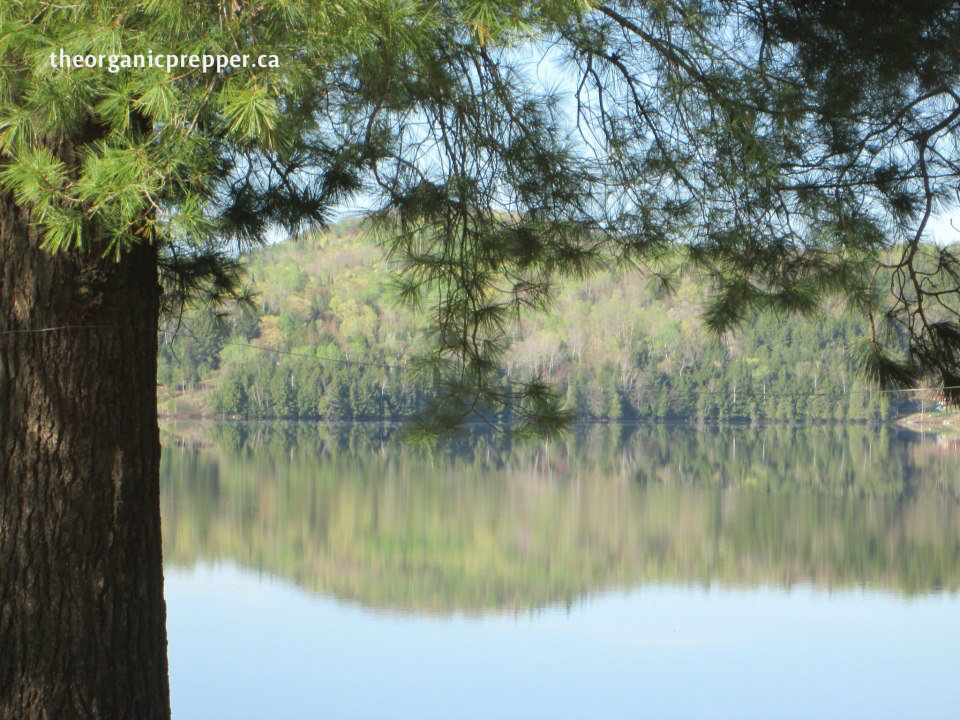
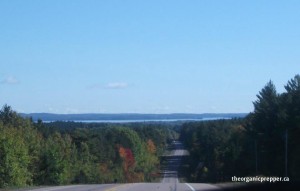
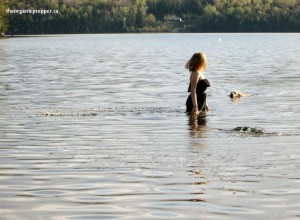
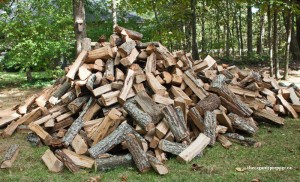

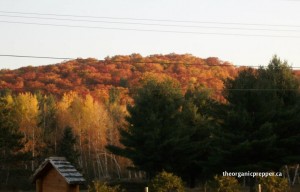
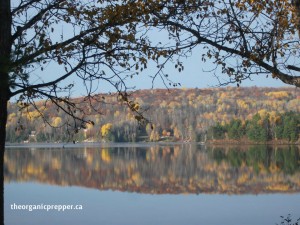
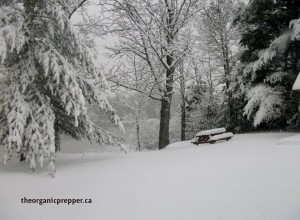
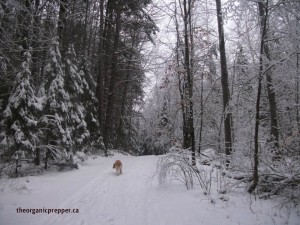
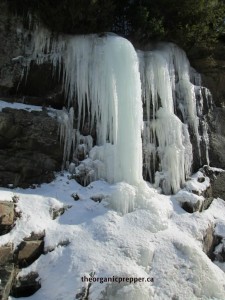

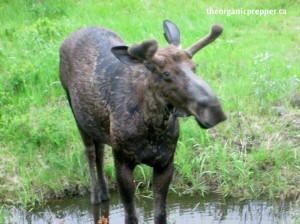
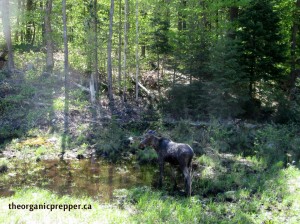
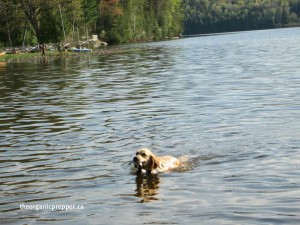
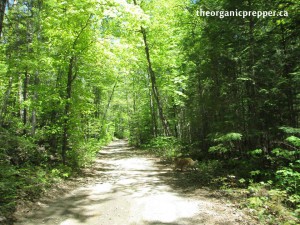














30 Responses
Best of luck on your adventures. I’m sure the climate will be better in the NW. I can sympathize about the black flies (no see ums) from long past bass fishing trips to Black Lake in Ontario. Still can’t figure out what your retriever was fetching. Don’t really look like a duck though. Happy trails.
JRS – that was a big stick I was throwing for her into the lake – she fetched it so many times the bark was coming off. 🙂
Thank you for your good wishes!
Daisy
Only non-toxic stuff I’ve ever found that works to keep off bugs, including blackflies: BuggleBlue. It was invented only a year or two ago by a mom in her kitchen in Maine. Made from herbs and baby soap, as I recall. Safe to use on people and dogs. Smells nice. Doesn’t make your skin feel icky. Rinses off with water. A bit pricey, but you don’t need much at a time, so it lasts. Her company is online. (I have no association with them other than as a grateful customer.)
That is a beautiful part of this Country! I have driven through the park on my way to North Bay, Ont. Last year I had to stop on the Hwy as there must have been 50 people stopped and out of their cars (taking pics of 2 huge moose) The people didn’t even bother the moose and they just kept right on eating!
Daisy, you know that I will miss you (and sweet little Rosie) I will never 4get you ……but at least I can (and will) get over to your blog when possible.
I wish you all the best…..let me know if you are coming through my ‘neck of the woods’ on your journey, maybe we could share a java……until later, CC
What a delightful report on learning how to be self-sufficient in the wilds of Canada. May you enjoy the very best in your new life and adventure. Godspeed!
Your doing the right thing, those in the wilderness may survive whats coming. Looks like about 2 cord a wood, you might run out, i always used about 5 to 6 cord for a wintering.
Daisy,
Thank you for sharing your experiences living at the northern cabin. I admire your honesty and your spunk.
I wish you the very best in your travels and at your new home!
Take care!
KY Mom
I wonder if Absorbine Jr. would have the same repellent effect on those Canadian black flies as it does on Midwestern gnats?
Also, the end of this blog entry said, “moving to a little organic farm in the Pacific Northwest”
I’ve heard it’s not the Northwest, rather, it’s the NorthWet.
It sure is pretty out there though.
Yup , get ready for the wet and no sun , if it’s going to be on the west side of the Cascades. However if it’s east of the coastal mountains the weather will be similar to that of Canada. Maybe slightly warmer tho.
God Bless you on your journey and your new adventure. I look forward to reading your reports. I have found that taking a double shot of organic acv about 20-30 minutes before going outdoors keeps the mosquitoes away. Don’t know about black flies, but it’s worth a try.
Daisy, Great article. Thanks for sharing. I especially appreciate your take on making mistakes. Some clever dude once said that if you have never made a mistake in your life before, you probably have never made anything yourself.
I live just south of Seattle and it’s not that wet here. It’s darker during the winter, but not that bad!! We can grow a lot of produce around here and with cold frames, hoop houses and low tunnels, year round gardening is possible and fun!
Besides, when it rains here, it just drizzles and stuff, so it’s easy to throw on a rain coat and trudge out to do chores!
This post was amazing, thanks so much for writing…I’ve been experimenting with keeping fire going, learning the difference between “hot” wood and “soft” wood and so on and so forth….it’s an education alright!
I live in hot, hot Louisiana so the whole snow thing is not something we deal with. We have hurricanes! I agree, starting a fire and keeping it going is not like throwing a match on some wood. Everything takes much more practice than you can imagine. I’ve taken the job of teaching my grandsons survival skills. I just started my first organic garden and like fire starting, growing vegetable takes practice. I’ve had dead plants, too much water, not enough water, sudden cool nights and now 95 degree heat. I look forward to more of your adventure stories.
That was a great story, thank you for sharing it.
My children were a little upset with me teaching 6-8 year old grandchildren to build a fire in a stove and keep it going until I pointed out that being able to start a fire might very well save their life in the future.
If you can’t heat with wood, cook over a open fire, grow a garden and perserve food you can’t survive off the grid. Just look how dependant you were on electricity and that little store just down the road. And of course, it all depends on a source of potable water, not water bought in a jug which will not exist.
Good story, but you just scratched the surface of true survival.
Daisy: Thank-you for another interesting story of your adventures in Canada’s north. I really enjoyed it. I wish you well on your new adventure in the Pacific Northwest. Keep the stories coming. I encourage you to bring the same enthusiasm to your new endeavours and I am sure it will be a great success. I’m sure your stories encourage others to try. I know you are authentic as I have lived some of what you have been writing about & the stories ring true to me. Take time to have a fun and adventurous trip out west. If the economy goes to pot who knows when you will be able to do it again. Looking forward to more of your adventure stories.
Daisy –
Don’t you dare berate yourself for having trouble building a fire. I heat & cook with wood & coal and I’m here to tell you that it’s a forgotten “domestic art”.
There’s a real learning curve to “keeping the home fires burning” 🙂
Enjoy your journey cross country. I will look for you at the Farmers markets and Barter Fairs.
Thanks for sharing your experiences. I realize doing things once or twice is not the same as doing them under pressure of reality. Since I have not yet moved “off grid”, I worry that my “practice tryouts” won’t give me the experience I really need. Fortunately, I live in a moderate climate and probably won’t ever see any temperature below 10 degrees.
I really enjoyed your story of your back to basics experiences. It was so positive and possible, really refreshing, in contrast to the fear and foreboding that hangs about us these days. Thank you for sharing.
Daisy, I wish you all the best in “The American Redoubt” as JWS of survivalblog.com calls it. In early May I worked out an arrangement with one of my cousins in the mountains of north GA for a BOL and have already spent two weekends moving part of my supplies there. I finally after all these years at least have a “PLAN B” to leave the city when TSHTF. The BOL is just a little more than a tank of gas from my home. I have some extra 5-gal. cans of gas just in case. My relatives were all born and raised on farms so they can grow food in their sleep. They are all “prepper born and bred”. They all learned how to hunt, fish, camp, forage, handle firearms and archery from the earliest possible age. they all have homesteads and grow their own gardens and have some livestock. I know I’ll have a lot more to learn when I get to the BOL. braveheart
WISH I could convince my spouse to emulate !
Good Luck…!
I enjoyed your article so much. The forgotten skills are attainable-the learning curve is what can kill you! 🙂 I moved from Los Angeles to the Sierras after my mom died. Talk about culture shock! My house was well insulated, had all of the civilized options, yet I also had a well and septic. Kind of the best of all worlds. Then when the fires took out a substation, or winter froze the pipes and blocked the roads-you get a reality check. I learned about storing water doubletime quick! We used a one lane suspension bridge over the American River to get from the “city” side to our side. One winter evening, after working a 12 hour shift, I found the road closed for 14 miles before the bridge. Since I had animals at home, I doubled back (try turning a car around on a 2 lane road with snow and ice) through town, sped through the various mountain passes, and tried to get up through the forest to my house. The Highway Patrol was right behind me, closing the road! Luckily, I got home. It taught me that no woman is an island-the neighbors “next door” got a key so the animals had food and water. Ah-the 10,000 lessons in life! Good luck in the Great Northwest!
Good luck to you, Daisy. It’s a big, brave move. I always like women who try different things, even if difficult. Your sojourn into northern Canada sounds like that. Difficult but good, a great life changer, mostly positive.
I think this new move will work out for you.
Hi, Daisy, great post! My mom was excellent at building fires and keeping them going and she often spoke of how much she loved doing it! She also cut logs and piled them up–even when she was in her eighties! And she taught us all how to plant and take care of gardens! I was hoping she would be here when TSHTF because she would be an invaluable asset! Unfortunately, we lost her in 2012 (she was in her nineties).
Anyhow, I have some experience in all this too, thanks to my mom.
thanks for the great pictures and story…
Daisy, I really enjoyed reading this and it was very informative. Thanks a lot for writing it up!
Loved hearing about someone who actually DID the living of it. We have been 11 years off the grids in the near north (north of North Bay) and I really enjoyed reading your story. In case you are interested we have a ‘bush blog’ on our site. hope to keep reading as time allows. i work from home too so it’s a bit of a juggling act. As you well know however, the rewards are worth the effort! All the Best from the Bush,
Linda
I am sorry to read of the loss of your dog. I have issues with your “adventure” and the “wisdom” that you share. To be completely honest, you do nothing but piss me off. You use terms like “prepper” and “prepper mindset”.
You refer to the death of “your daughter’s father”, but not your husband. You claim the loss was traumatic to family, and I also understand that;a loss is a terrible thing.
A far more terrible thing is to create a blog with limited information, but merely as a cash cow generator for you. I understand learning takes a while, especially when off grid, in a prepper thought process, or in a SHTF mindset.
You, sadly, are exactly what you claim to be. An “alternative reporter”. Alternative, as in, “I make shit up as I go along”.
Algonquin Park, while remote, is not the end of the world. Nor is it NORTHERN CANADA CABIN COUNTRY. It’s only 3 hrs away from the nation’s capital.
The only useful information from your blog comes from real people, doing real homesteading, off grid living and assorted lifestyle innovations.
Your blog is filled with pay-to-click links, for each link clicked, you get a kick back.
My favourite ad:
“83 year old man makes machine that reduces his energy bill by 75%, in under 4 hours”
Why is there a picture of African males, with RPGs and AK-47’s, wearing Jihadist bandanas associated with this?
You are a manipulative fraud, but a wise one. You post disclaimers on your blog, at the very bottom.
you sicken me.
you, madam, are a vulture, preying on anyone who wishes to share information with you.
sad thing is, you can get away with it.
Dear Kate:
It’s easy to pick apart those of us who put our lives out there on the internet, isn’t it? It’s quite simple from your comfortable chair to suggest that I’m a horrible person, even though we’ve never met.
I said absolutely nothing that was untrue in my post. The wording you find objectionable about my daughter’s father is actually in effort to be truthful. I’m not a widow, but my children have lost their father. I’m not sure why you take issue with this.
I never claimed to be an expert in anything, but only shared my experiences, my mistakes, and what we learned. Alternative journalism, since you seem confused, is an alternative from the mainstream, not an alternative from the truth.
I do have ads on my website. These ads rotate and I do not choose the graphics. No one is OBLIGATED to click on the ads, nor are they obligated to spend money. The information I provide is free to anyone who opts to read it, and to anyone who opts to pick it apart as you have attempted to do.
Disclaimers are legally required by the Federal Trade Commission and are worded in accordance to their rules. I’m not quite sure how posting a disclaimer makes me “fraudulent.”
Have a nice weekend, and try to remember, behind every blog is a real human being with a real family. We share our lives to be encouraging to others, to inform, and to let people know that we’re all on a journey riddled with mistakes, but we get back up and continue on.
Thank you for your condolences on the loss of our dog.
Daisy
im trying to get attached with prepper group in north east ontario, kapuskasing. please tell others about me, it seems my family cant find anyone.